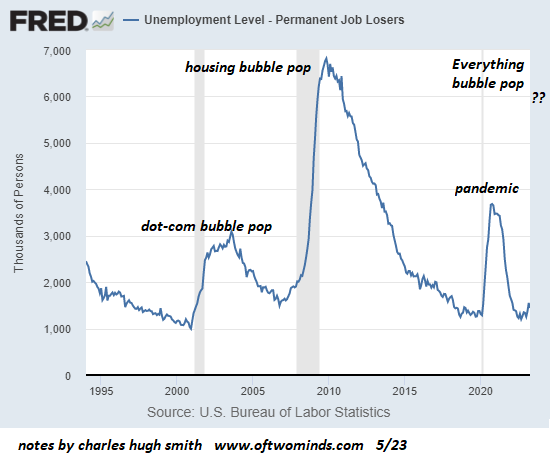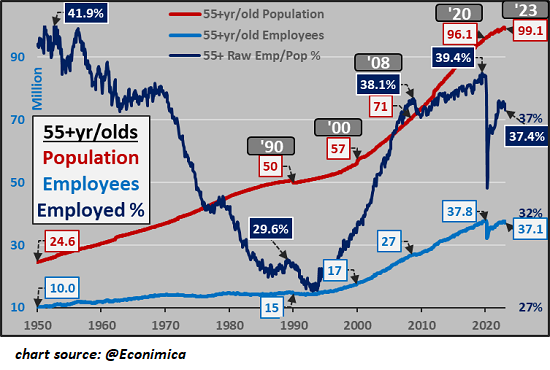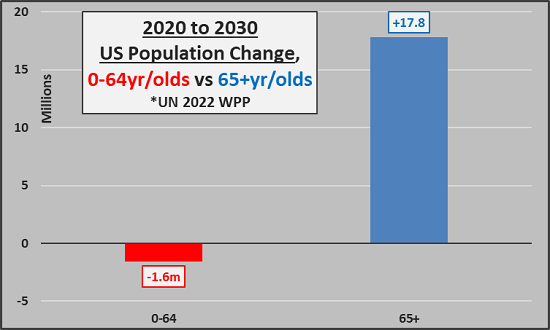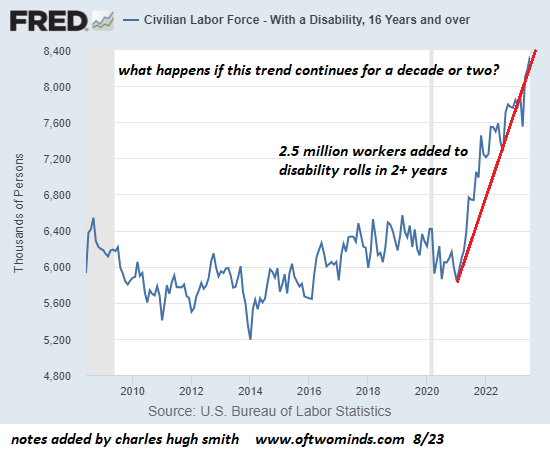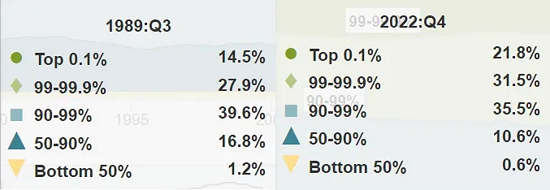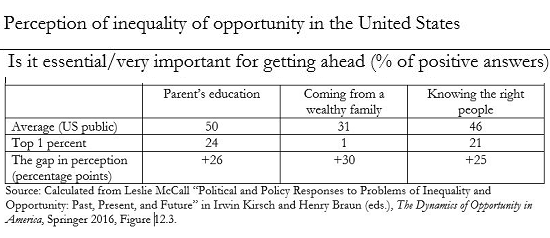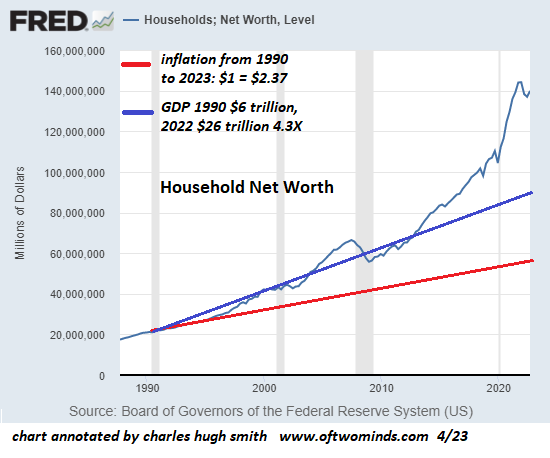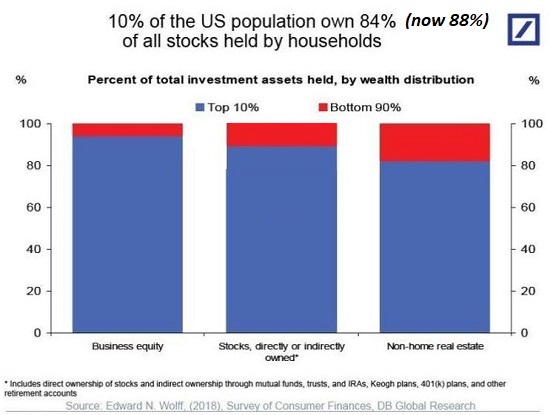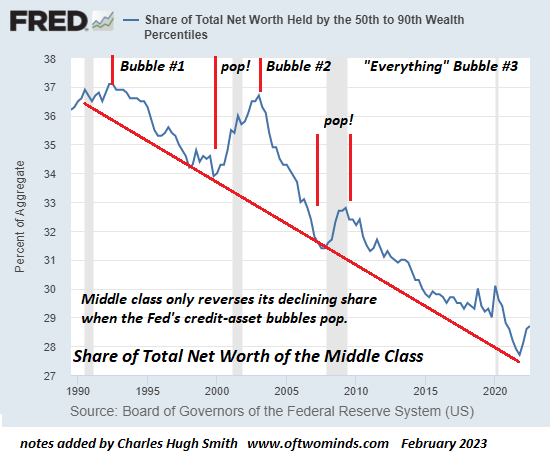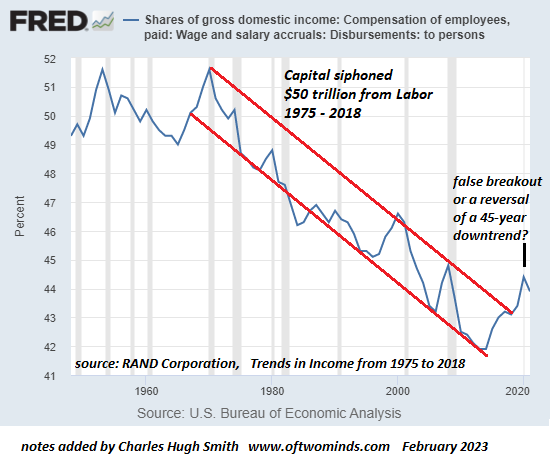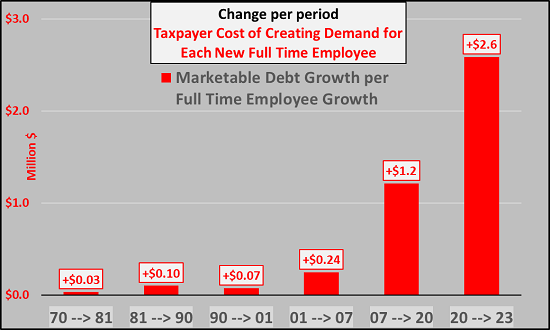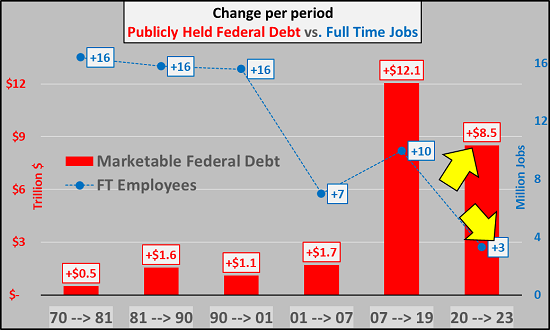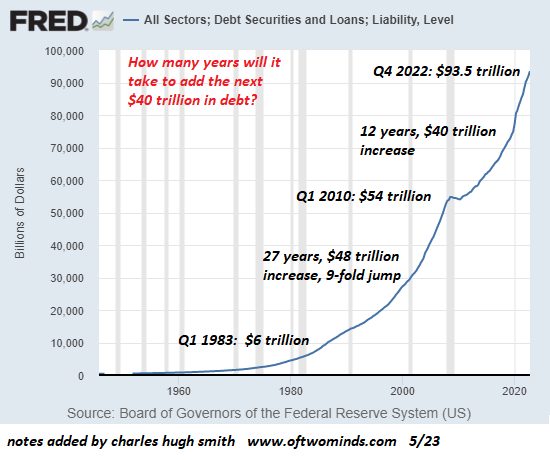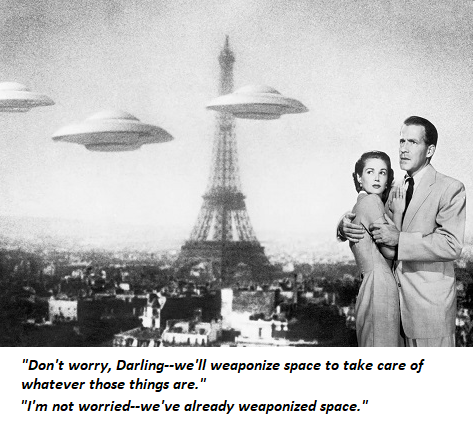Why Rome Collapsed: Lessons For the Present
No nation clinging to the current "waste is growth / landfill economy" will survive the emergent global polycrisis.
Identifying why the western Roman Empire collapsed in 476 AD has been a parlor game for at least two centuries, since Edward Gibbon published his monumental
The History of the Decline and Fall of the Roman Empire (Abridged). Gibbon concluded Christianity had a major role in weakening the Empire, a view few today share.
Part of the fun of the parlor game is trying to identify the one thing that pushed it over the cliff: poisoning from lead pipes and wine goblets being a famous example that has been discounted by modern historians.
New research is more holistic, considering factors that were ignored or dismissed in the past, such as climate change and pandemics.
The word polycrisis captures this basic view: there wasn't just one thing that toppled the empire, it was a confluence of crises that together nudged the empire to the breaking point. The empire was still robust and adaptive enough to handle any one crisis, but the onslaught of multiple, mutually reinforcing crises overwhelmed the resources of the empire.
The book
The Fate of Rome: Climate, Disease, and the End of an Empire does an admirable job of explaining the polycrisis of reduced crop yields and pandemics.
Another approach is that of Peter Turchin and other historians, who look at social and economic cycles. Turchin holds that the overproduction of elites leads to elite conflicts that weaken the leadership and soaring wealth-power inequality undermines the social coherence of the state/empire.
Ages of Discord: A Structural-Demographic Analysis of American History (2016)
End Times: Elites, Counter-Elites, and the Path of Political Disintegration (2023)
Historians such as David Hackett Fischer, author of
The Great Wave: Price Revolutions and the Rhythm of History and Thomas Homer-Dixon, author of
The Upside of Down: Catastrophe, Creativity and the Renewal of Civilization, examine the role of resource depletion, higher costs and diminishing returns for those doing the work of propping up the empire.
Historian Michael Grant makes the case for moral rot unraveling social coherence in his classic
The Fall of the Roman Empire.
Having read all these works and many others on the subject, it seems clear that all of these factors were part and parcel of the polycrisis that brought down Rome. Each factor added to the empire's already immense burdens while reducing its wealth and resources.
I would highlight three such consequential factors among many:
1. The depletion of the silver mines in Spain, fatally reducing Rome's money supply.
2. The Vandals conquering the North African breadbasket of Rome in 435 AD. The loss of this major wheat supply doomed Rome to scarcities that could not be made up elsewhere.
3. The decline of trade with India through Egypt as silver and gold supplies diminished, as this trade provided 20% of all Imperial revenues.
The Roman Empire and the Indian Ocean: Rome's Dealings with the Ancient Kingdoms of India, Africa and Arabia
The view substantiated by Peter Heather argues that the Roman Empire was neither on the brink of social or moral collapse, nor fatally weakened by resource depletion. What brought it to an end were the barbarian invasions from what is now Germany and Eastern Europe.
The fall of the Roman Empire: a new history of Rome and the Barbarians.
Heather argues Rome's great success eventually led to its undoing, as the small, loosely organized Barbarian tribes learned from the Romans how to form larger, more cohesive and thus more powerful social and military organizations. Rome's immense wealth was a magnet that attracted the Barbarians in two ways:
1. They wanted a piece of the rich Roman pie
2. In order to get that slice, they adopted Roman values and methodologies.
As a result of what they learned from Rome, the Barbarians became so formidable that Rome could no longer defeat them militarily, as they could when the tribes were smaller-scale and less cohesive.
Heather points out that late-era Rome faced multiple existential military threats, especially from the resurgent Persian Empire that Rome had battled for centuries. Despite its unwieldy size and bureaucracy, Rome managed effective adaptations that resolved the Persian threat.
Heather notes what other authors have focused on: Rome weakened itself by drawing an artificial distinction between "Barbarians" and "Romans." Barbarians were anyone not within the Imperial borders, which were well-defined and defended, a point made by Edward N. Luttwak in his classic study,
The Grand Strategy of the Roman Empire: From the First Century CE to the Third.
This distinction discounted the Barbarians and elevated the Romans, generating a fatal hubris in the Roman elites and squandering an opportunity to recruit the Barbarian tribes as stable allies. As with all human groups, if the rewards of alliance outweigh the risky gains of conquest, then leaders and their followers will pick alliance over conquest, the success of which is far from guaranteed.
So-called Barbarians became the core of the Roman army, and many of the most competent generals were either from the Roman hinterlands or they were Barbarians.
Rome had long exercised a military-diplomatic policy of defeating the Barbarians when they invaded Roman territories, but then making treaties with the Barbarian leaders that allowed the Barbarians to trade (and thus share the wealth) with Rome and settle within its borders.
In effect, Rome Romanized many Barbarian tribes over the centuries, mostly with "soft power" (diplomacy, sharing the wealth, cultural absorption) rather than "hard power" (military force).
As Luttwak documented, Rome maintained relatively modest-sized armies, but these armies were professional: very well-trained and armed, highly disciplined, and well-supplied. It staggers the imagination to read that a Roman army on the move constructed a wooden barricade every night to enable the troops to sleep secure from surprise attack. Rome also built a remarkable number of permanent masonry forts throughout its vast territories that acted not just as fortifications but as supply depots, administrative headquarters and towns with commerce and conveniences.
Heather observes that Rome made a fatal mistake in allowing the re-settlement of not-yet-Romanized Barbarians and then not policing them and not honoring the agreed-upon terms. This unleashed a marauding army within Rome's borders.
To show how polycrises work, Heather also noted that this massive influx of Barbarians was largely driven by pressure from Eastern nomads like the Huns who originated in Central Asia. (Attila the Hun wreaked havoc from 434 until his death in 453 AD.)
There is persuasive evidence that tribes from Central Asia moved westward into Europe in response to climate change--reduced rainfall led to less fodder for horses and less food for humans, forcing the move to the relative abundance of Europe.
In effect, climate change doomed Rome by unleashing such massive waves of Barbarian migration that it could no longer manage or repel the Barbarian armies.
In summary, Rome became dependent on the Barbarians for its military might while treating them with social distain, and mismanaging the integration of Barbarians, a task it had handled so admirably in an ad hoc but practical manner.
What can we learn from this complex history of unfolding polycrises?
We can start by observing how climate change (regardless of its source), pandemics, mass migrations, the hollowing out of the money supply, over-extended military commitments, the rise of new threats, declines in harvests and grain supplies, the hubris of ruling elites and extremes of wealth-power inequality all feed off of and reinforce each other.
Put another way, polycrisis is endemic to complex, interconnected systems. If the problems were limited to 1+1+1+1+1=5, the empire could maintain its coherence and adapt in ways to resolve the multiple overlapping crises.
But emergent systems--that is, complex, interconnected systems--are not just a collection of dynamics; the resulting polycrisis has its own dynamics and unique features that are distinct from the features of the five sub-crises. In other words, 1+1+1+1+1=15, and the system / empire is overwhelmed and collapses.
This is why polycrises are different from existential crises: the system could handle one, two or even three crises with its existing resources and structures, but a fourth anf fifth crises changes the nature of the threat.
As a thought experiment, consider how World War II might have gone for the US if:
1) the US hadn't been the world's leading producer of oil, steel, etc.
2) a pandemic had ravaged the young generation needed to expand the military.
3) The Dust Bowl had expanded to include the entire grain-growing Midwest of the US.
Even the most capable leaders still need a productive workforce, a population youthful and healthy enough to staff a military, access to essential resources and cooperative weather / food supplies.
Roman emperor Marcus Aurelius had to auction off the imperial treasure to raise desperately needed cash to fund an expanded military, but he had the treasure, manpower, resources, legacy organization and values to manage the multiple crises he faced as emperor. It was no easy task, hence his Stoicism.
But he still had the foundations of Roman power, both soft and hard power, and enough remained of traditional values and stored wealth to support the necessary adaptation and mustering of resources.
As resources are depleted and climate change disrupts the few breadbaskets of the world, which nations will have the foundations of values, organization, resources, human capital and wealth to survive polycrises?
In my book
Global Crisis, National Renewal, I argue that no nation clinging to the current "waste is growth / landfill economy" will survive the emergent global polycrisis. Only those nations that embrace degrowth and a set of values other than maximizing financial gains for the elites will have the means necessary to adapt and emerge not just as survivors but as more adaptable and resilient.
This essay was drawn from my Weekly Musings Reports sent exclusively to subscribers, patrons and Substack subscribers. Thank you very much for supporting my work.
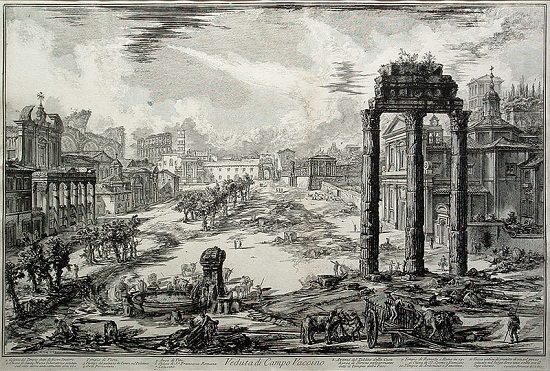
 My new book is now available at a 10% discount ($8.95 ebook, $18 print):
Self-Reliance in the 21st Century.
My new book is now available at a 10% discount ($8.95 ebook, $18 print):
Self-Reliance in the 21st Century.
Read the first chapter for free (PDF)
Read excerpts of all three chapters
Podcast with Richard Bonugli: Self Reliance in the 21st Century (43 min)
My recent books:
The Asian Heroine Who Seduced Me
(Novel) print $10.95,
Kindle $6.95
Read an excerpt for free (PDF)
When You Can't Go On: Burnout, Reckoning and Renewal
$18 print, $8.95 Kindle ebook;
audiobook
Read the first section for free (PDF)
Global Crisis, National Renewal: A (Revolutionary) Grand Strategy for the United States
(Kindle $9.95, print $24, audiobook)
Read Chapter One for free (PDF).
A Hacker's Teleology: Sharing the Wealth of Our Shrinking Planet
(Kindle $8.95, print $20,
audiobook $17.46)
Read the first section for free (PDF).
Will You Be Richer or Poorer?: Profit, Power, and AI in a Traumatized World
(Kindle $5, print $10, audiobook)
Read the first section for free (PDF).
The Adventures of the Consulting Philosopher: The Disappearance of Drake (Novel)
$4.95 Kindle, $10.95 print);
read the first chapters
for free (PDF)
Money and Work Unchained $6.95 Kindle, $15 print)
Read the first section for free
Become
a $1/month patron of my work via patreon.com.
Subscribe to my Substack for free
NOTE: Contributions/subscriptions are acknowledged in the order received. Your name and email remain confidential and will not be given to any other individual, company or agency.
|
Thank you, Lisa P. ($75), for your monumentally generous contribution to this site -- I am greatly honored by your steadfast support and readership. |
Thank you, Tim K. ($5/month), for your marvelously generous patronage to this site -- I am greatly honored by your steadfast support and readership. |





















